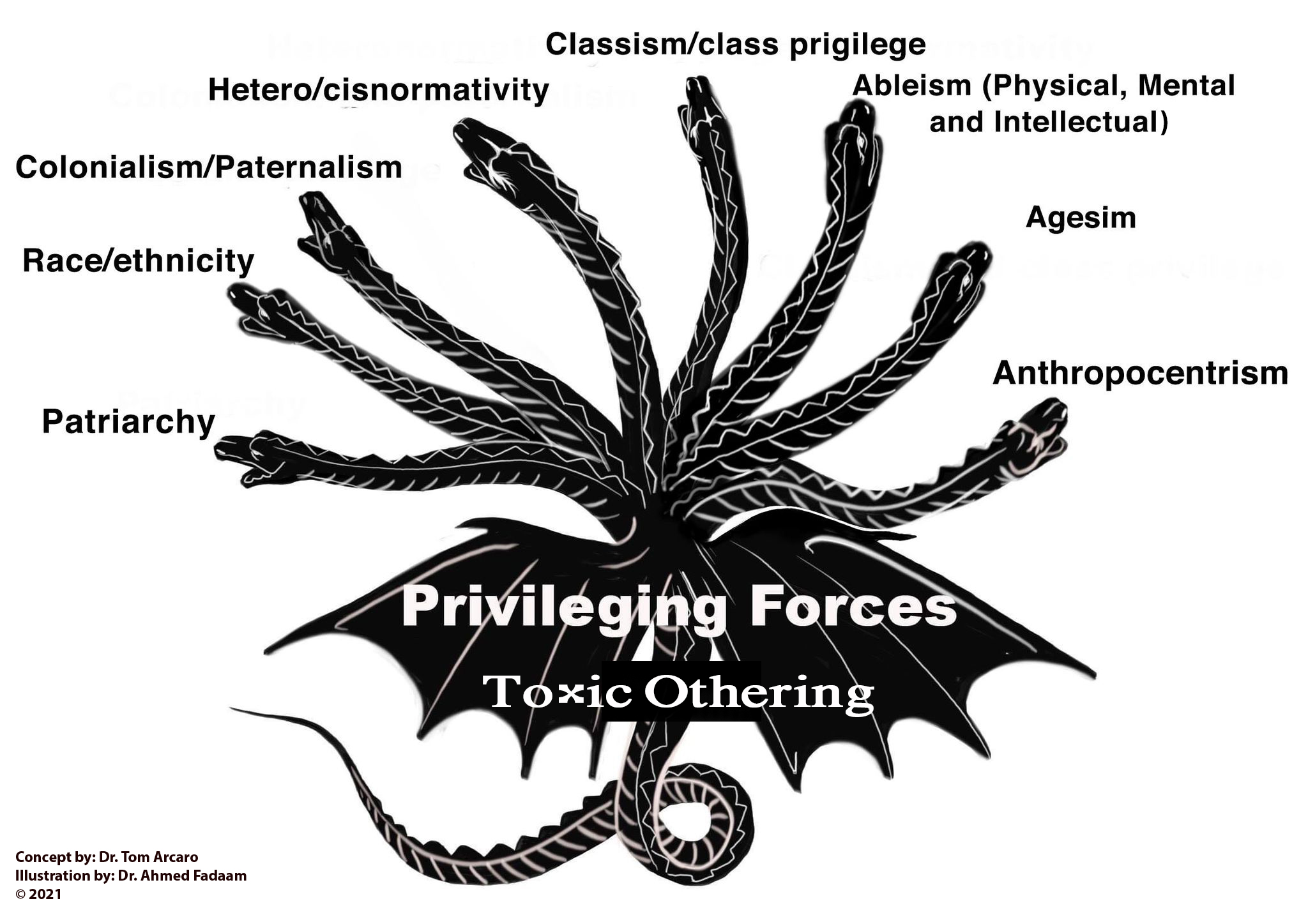Book review
I am excited to post a review of Confronting Toxic Othering: Understanding and Taming the Hydra by Australian author and critic Chrys Stevenson. Her review was published in the Winter 2022 edition of The Australian Humanist and is being used below with permission.
Work on a revised edition of Confronting Toxic Othering: Understanding and Taming the Hydra is currently in progress with plans for re-publication in September, 2022.
Power and Privilege: the ‘Hydra’ Model of Intersectional Discrimination
Chrys Stevenson reviews Confronting Toxic Othering: Understanding and Taming the Hydra by Dr Tom Arcaro
“Intersectionality is a lens through which you can see where power comes and collides, where it interlocks and intersects.” – Kimberlé Crenshaw
Tom Arcaro is a professor of sociology at Elon University with a special interest in humanitarian aid. Arcaro has made it his mission to understand how power and privilege function to marginalise certain groups in society.
Arcaro starts with the basic humanitarian principle that all human lives have equal worth. “Given that premise,” he says, “our challenge is to understand the social forces that are a threat to that assumption and frequently lead to humanitarian crises.”
Through his work with humanitarian development and aid, Arcaro began to notice a particular phenomenon. He identified 11 key social forces working persistently, but in various combinations, to privilege certain groups in society and to marginalise others. Developing this insight with his students in the US and Rohingya refugees in Bangladesh, Arcaro came to conceptualise these “privileging forces” – patriarchy, racism, ableism, ageism, colonialism, paternalism, classism, heteronormativity, cisnormativity, anthropocentrism (dominionism), and religion – as the many heads of a Hydra.
Arcaro sees the Hydra analogy as a tool to help people visualise how intersectional discrimination functions. He sees these forces (or heads) working together dynamically in constantly changing combinations as they fight to maintain the status quo of global power structures.
He explains
“A Hydra, the many-headed serpent in Greek mythology, is a good analogy for ‘privileging forces’. According to mythology, this dragon-like beast is immortal, and when one of its heads is cut off, two more grow in its place. So it is with privileging forces, an ever-present demon humanitarians must fight that has many toxic manifestations.”
If the heads of the Hydra are the privileging forces, its body – the entity they feed – is ‘othering’; the dehumanisation of an out-group in order to rationalise discrimination and violence against them. In modern society, says Arcaro, this process is frequently fuelled by unchecked capitalism and neoliberalism.
Arcaro also sees deep connections between ‘othering’ and colonialism/imperialism. In the contemporary context of Russia’s imperialistic war on Ukraine, this quote from John A Powell and Stephen Menendian really strikes home:
“The problem of the twenty-first century is the problem of ‘othering.’ In a world beset by seemingly intractable and overwhelming challenges, virtually every global, national, and regional conflict is wrapped within or organized around one or more dimensions of group-based difference. Othering undergirds territorial disputes, sectarian violence, military conflict, the spread of disease, hunger, and food insecurity, and even climate change.”
Arcaro explains:
“‘Othering’ is basic to our species; there has always been a ‘us’ and ‘them’ … Othering is part of our genetic motherboard.
… Sexism, racism, heteronormativity, just to name a few, have been literally baked into our social and cultural worlds.”
The theory of intersectional discrimination, developed by civil rights activist, Kimberlé Crenshaw, tells us that many people are ‘othered’, by not just one, but by many heads of the hydra – they are ‘multiply burdened’. Sometimes, the multiple heads will attack in unison, at other times, the attacking head depends on the context in which the marginalised person finds themselves.
For Arcaro, a key strategy for ‘de-ossifying’ the mental and social structures which enable othering is to raise consciousness; to make the problem visible and comprehensible. Arcaro describes the aim as closing the gap between the ‘is’ and the ‘ought’.
While Arcaro is an academic, “Taming the Hydra” is intended for the general reader – particularly those working within the humanitarian sector. Arcaro hopes his Hydra model will make it easy for the average person to understand what challenges marginalised people face and to recognise their own privilege.
As he points out, those who recognise their own privilege have been branded with the derogatory term “woke”; but it’s really a description one should wear with pride. Being “woke” is the first, necessary step, towards implementing change.
Tom Arcaro’s Confronting Toxic Othering: Understanding and Taming the Hydra reminds us that, if we are to ‘bend the moral arc towards justice’ it is up to us recognise and fight against the many-headed hydra. Rejecting the role of ‘white saviour’, Arcaro says:
“We do not fight these privileging forces on behalf of those marginalized, or as an act of charity. We oppose privileging forces because they create unjust systems, and we believe in the moral obligation to resist injustice.”
Toxic Othering: Understanding and Taming the Hydra is available in paperback or as an e-book (Kindle) at amazon.com
Thank you
I want to thank Chrys for such a thoughtful review. I am humbled that my words have reached ‘down under’. If any readers have comments, questions, or feedback of any kind I am always learning and am open to hearing your thoughts. A concern for human dignity is certainly a cultural universal, and I only hope that the simple tool of the Hydra serves to move the moral arc even closer to justice.


 Follow
Follow